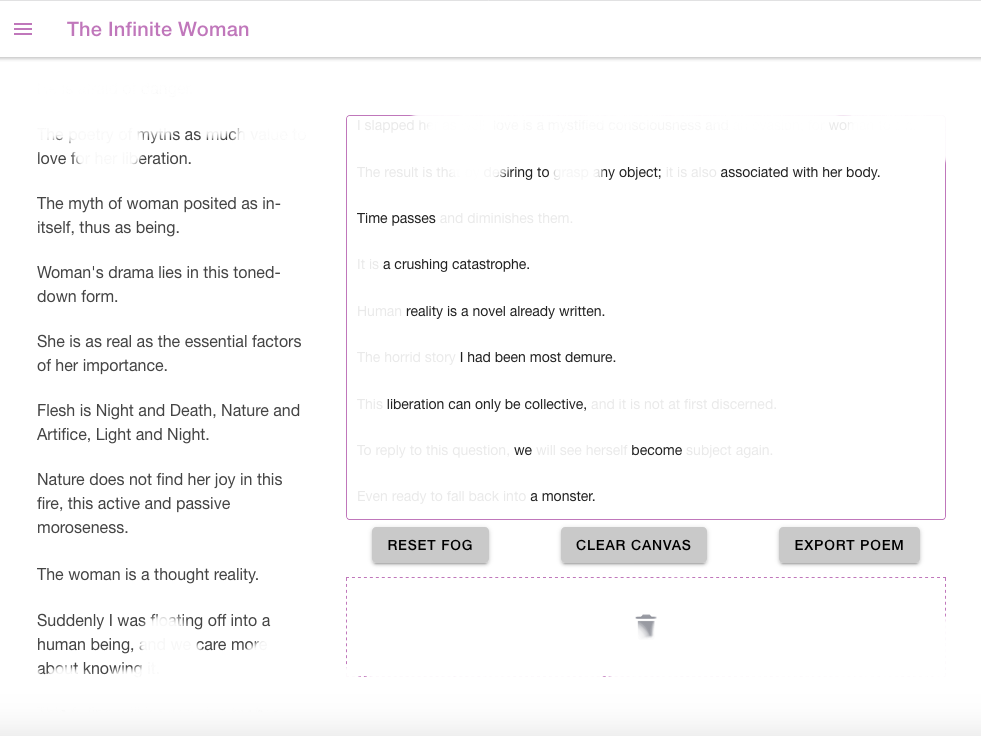The Infinite Woman
Katie Schaag
The Infinite Woman is an interactive poetry platform hosted at theinfinitewoman.com. A continuously mutating digital book, The Infinite Woman computationally performs contemporary poetic techniques of remix (combining two or more texts) and erasure (removing or extracting existing language to reveal patterns). With Katie Schaag’s creative direction, the platform was designed and implemented by Alayna Panlilio, Ryan Power, Josh Terry, Alex Yang, and Jeffrey Zhang at the Georgia Institute of Technology in 2019. It’s a cross-platform web app and should be compatible with all devices and all internet browsers (except Safari).
As a feminist critique and artistic intervention, the project remixes excerpts from Edison Marshall’s The Infinite Woman (1950) and Simone de Beauvoir’s The Second Sex (1949). Marshall’s novel is a melodramatic, male-authored, first-person fictional narrative in the voice of Lola, a protagonist who embodies the ideal of natural womanhood. Beauvoir’s existentialist philosophy of gender deconstructs the myth of the eternal feminine. The web app digitally recontextualizes the voice of “the infinite woman” as a machine.
An n-gram algorithm procedurally generates infinitely scrolling sentences that recombine and recontextualize the two source texts’ vocabulary and syntactic patterns. By remixing Marshall and Beauvoir, the algorithm infinitely generates language that attempts to describe and critique an eternal feminine essence. Revealing patterns through iterative permutations, the algorithm stretches the logic of the infinite woman to the breaking point.
Meanwhile, fog slowly erases the screen – materializing “the misty mirror of the eternal feminine” (Marshall + Beauvoir) and visually echoing the erasure poetry method. As an abstract ideal form, the eternal feminine resists concretization, and yet every line scrolling past attempts to capture some molecule of it. The encroaching fog signals the impossibility of ever directly apprehending the infinite woman.
Users can select sentences from the infinitely scrolling text to send to the canvas workspace, where they can erase words and rearrange sentences. These user-generated erasure poems are multivocal repetitions with a difference, rewriting the ephemeral voice of the infinite woman. The deconstructive gesture becomes a generative gesture, proliferating possibilities for reimagining womanhood and femininity, hopefully with trans and nonbinary perspectives at the forefront.
To create the automatically scrolling infinite scroller, Panlilio, Power, Terry, Yang, and Zhang combined the functionality of the Ionic content module and infinite scroll module. They used Python to program an n-gram algorithm that semi-randomly generates the remixed sentences based upon predictions of which words are most likely to follow each other. They used Angular to organize the site’s layout, and TypeScript to implement interactive elements. To allow users to click on the scrolling text and send it to the canvas, they used Angular’s mouse events and converted each sentence into a button. Then they used Angular’s DevKit to allow users to drag and drop sentences within the canvas. To allow users to erase individual words by clicking on them, they used Angular’s innerHTML property to add HTML span elements and CSS to each individual word. Finally, they created the fog with the p5.js platform.
Note: The web app can run on any browser except Safari. It works best on a laptop or desktop. If the page is stuck on "Generating sentences..." the user should refresh the page. If the text freezes and is not scrolling, the user can refresh the page or click on the last line.
About the Artist
Katie Schaag is a writer, artist, and theorist making work for the page, stage, gallery, screen, and social context. She earned her PhD in English Literature at the University of Wisconsin-Madison, with a specialization in performance studies and visual cultures and a minor in fine art and creative writing. Her first scholarly book project, “Conceptual Theatre,” theorizes minoritarian avant-garde closet drama, conceptual art, and digital media. Her second project, “American Plasticity,” theorizes plastic’s queer materiality. Her scholarly writing is published in Performance Research, Inter Views in Performance Philosophy, and Modern Drama, and her public multimedia essays appear in Edge Effects and Yes Femmes. Her creative writing usually takes the form of experimental scripts and scores, which she remediates into site-specific performances, artist’s books, theatrical situations, and multimedia installations. Her poems and plays have been staged at Hemsley Theatre and published by Requited Journal, Datableed, Oxeye Press, and elsewhere; and she has performed or exhibited her work at Woman Made Gallery, Co-Prosperity Sphere, Little Berlin, and elsewhere. In addition to her solo art practice she has a collaborative practice with SALYER + SCHAAG; their four-month participatory project Performing MMoCA was selected for Madison Museum of Contemporary Art’s 2016 Wisconsin Triennial. She co-founded the Art + Scholarship Mellon Workshop and the Madison Performance Philosophy Collective, and co-curated a series of Theory-Practice Collaboratories and Mad Theory symposia. She is currently a Marion L. Brittain Postdoctoral Fellow in the School of Literature, Media, and Communication at Georgia Tech.
